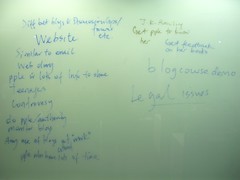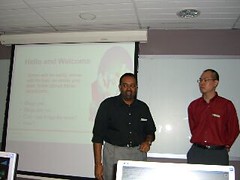DISCLAIMER: This blog serves as a teaching and demonstration tool. It is NOT affliated or endorsed by any organisation.
September 01, 2005
Books on blogging
Here's a link to a list of blogging-related books available from the NLB. If anyone wishes to recommend additional books or resources, feel free to post a comment here.
Sept 1 session (afternoon): Main discussion points
We modified our approach a little bit for the afternoon session, based on a quick review of this morning's session before we went for lunch.
For the afternoon session, we did pretty much the same except that we conducted the demo a little slower (for the hands-on blogging part).
Some participants tended to get a little mixed up over the "User Name" (when they register for blogger), the "Blog Name" for the blogspot site, as well as the "Blog Address". Not surprising, since many of them had no experience in creating their own homepages.
But Rajen and I felt that for a group that had no experience in creating personal homepages, they did very well. Everyone today (morning & afternoon's session) was able to create a blog of their own, create posts, change the template, add comments, post comments in other people's blog, delete comments and also deleting a blog.
This is a snapshot of the discussion points raised for the afternoon session:

We took these down before the start of the session. We asked what came to the participant's minds when they hear about "blogs". We had responses like "it's a website", "it's similar to email", "it's a web diary", "it's put up by people with lots of info to share", "it's a teenager thing", "it's controversial".
At the end of the session, we asked them to review those same points noted earlier. One thing all agreed that it wasn't just a "teenage thing" and blogs aren't necessarily controversial.
Someone asked "do people or authorities monitor blogs". I took that question and said I don't really know. Basically, to blog is to publish. So do it responsibly.
As with the morning session, the participants were also interested in legal issues regarding blogs. The point Rajen & I tried to make was that existing laws applies -- you'd get into trouble if you make inaccurate or inappropriate statements.
We had a point noted down -- "Any use of blogs about work?" (whatever "work" might be). We discussed about corporate blogging. Mentioned about IBM blogging guidelines, and shared the example of Microsoft's Channel 9.
And just like the morning session, we showed them Bloglines as an example of a RSS newsreader.
Judging from the participants' responses & written feedback, the course seemed to have met the stated course objectives.
For the afternoon session, we did pretty much the same except that we conducted the demo a little slower (for the hands-on blogging part).
Some participants tended to get a little mixed up over the "User Name" (when they register for blogger), the "Blog Name" for the blogspot site, as well as the "Blog Address". Not surprising, since many of them had no experience in creating their own homepages.
But Rajen and I felt that for a group that had no experience in creating personal homepages, they did very well. Everyone today (morning & afternoon's session) was able to create a blog of their own, create posts, change the template, add comments, post comments in other people's blog, delete comments and also deleting a blog.
This is a snapshot of the discussion points raised for the afternoon session:

We took these down before the start of the session. We asked what came to the participant's minds when they hear about "blogs". We had responses like "it's a website", "it's similar to email", "it's a web diary", "it's put up by people with lots of info to share", "it's a teenager thing", "it's controversial".
At the end of the session, we asked them to review those same points noted earlier. One thing all agreed that it wasn't just a "teenage thing" and blogs aren't necessarily controversial.
Someone asked "do people or authorities monitor blogs". I took that question and said I don't really know. Basically, to blog is to publish. So do it responsibly.
As with the morning session, the participants were also interested in legal issues regarding blogs. The point Rajen & I tried to make was that existing laws applies -- you'd get into trouble if you make inaccurate or inappropriate statements.
We had a point noted down -- "Any use of blogs about work?" (whatever "work" might be). We discussed about corporate blogging. Mentioned about IBM blogging guidelines, and shared the example of Microsoft's Channel 9.
And just like the morning session, we showed them Bloglines as an example of a RSS newsreader.
Judging from the participants' responses & written feedback, the course seemed to have met the stated course objectives.
Sept 1 session (morning): Main discussion points
Ok, we had our first session this morning at 10am to 12.30pm.

Rajen (L) & Ivan (R)
We asked participants what were their perceptions of blogs at the start of the session. Some mentioned "Personal Diary", "Personal homepages/ websites", "Daily Journals", "Online Hyde Park", "Brag Site". [Perhaps participants can comment here to see if their perceptions have changed after the session. Rajen & I reviewed our morning session and felt we could have shared more examples of educational & academic blogs].
Participants learnt how to create blogs, name their blogs, how to post comments, change the template of the blog, and how to delete their blog (we used Blogger.com).
Someone asked what's the difference between blogs and Discussion Forums/ Chat Rooms/ Community Groups. Unfortunately we didn't have time to address that question.
Most seemed keen to find out more about legal issues & copyright w.r.t. blogging. The session also covered how to search for blogs using tools like Technorati.com
From the feedback forms, we think the session went quite well. Of course like all things, there are always lot of room for improvement.
To participants who manage to find their way to this demo site, please feel free to share your feedback and comments.

Rajen (L) & Ivan (R)
We asked participants what were their perceptions of blogs at the start of the session. Some mentioned "Personal Diary", "Personal homepages/ websites", "Daily Journals", "Online Hyde Park", "Brag Site". [Perhaps participants can comment here to see if their perceptions have changed after the session. Rajen & I reviewed our morning session and felt we could have shared more examples of educational & academic blogs].
Participants learnt how to create blogs, name their blogs, how to post comments, change the template of the blog, and how to delete their blog (we used Blogger.com).
Someone asked what's the difference between blogs and Discussion Forums/ Chat Rooms/ Community Groups. Unfortunately we didn't have time to address that question.
Most seemed keen to find out more about legal issues & copyright w.r.t. blogging. The session also covered how to search for blogs using tools like Technorati.com
From the feedback forms, we think the session went quite well. Of course like all things, there are always lot of room for improvement.
To participants who manage to find their way to this demo site, please feel free to share your feedback and comments.
August 27, 2005
Checklist for 1 Sept course
We've confirmed the course package (for purposes of copyright, we can't show them here). The training is confirmed on 1st Sept 2005.
Last we heard, both sessions are fully registered. 45 people signed up, so let's see if all turn up that day.
Checklist:
Last we heard, both sessions are fully registered. 45 people signed up, so let's see if all turn up that day.
Checklist:
- Do a reece of the training venue
- Rehearsal
- Powerpoint slides (what would we do without Powerpoint?)
- Printouts of the courseware
- Participants' namelist
August 03, 2005
What the demo will cover
We have about an hour for the hands-on portion for the course. We'll be showing them how to create a blog using Blogger -- to show them something else while we are using Blogger here just doesn't seem quite right, does it? :)
Step 1: Creating an account
Step 2: Choosing a name
Step 3: Choosing a template
That's it. Then we'll go around the classroom to help the participants.
How's that?
I think most might be stuck with choosing a name for the blog.
Step 1: Creating an account
Step 2: Choosing a name
Step 3: Choosing a template
That's it. Then we'll go around the classroom to help the participants.
How's that?
I think most might be stuck with choosing a name for the blog.
August 02, 2005
Course objectives - Blogging course: MICA Innovation Fiesta 2005
[For reasons of copyright, we're unable to show the full content of the course]
Ok, we want to define the course objectives here.
Ok, we want to define the course objectives here.
- Define, understand the types and uses of blogs
- Know basic terminologies associated with blogs
- Create your own blog
- Make an informed choice on blogs and blogging
August 01, 2005
Finally, a name!
Hello World.
Our names are Rajendra Munoo and Ivan Chew. We started this blog as a demonstration tool for the Blogging Course that we have been asked to conduct for the MICA Innovation Fiesta 2005:
Rajen has a blog at ExpatLibrarian. I'm sometimes known in the Blogosphere as the RamblingLibrarian.
We're conducting this particular course for the first time. We'll see how it goes
We've got very good feedback from our first run (both sessions). Certainly the participants understood more about blogs, what is it (and isn't). We'll be updating this blog from time to time, depending on future sessions.
Our names are Rajendra Munoo and Ivan Chew. We started this blog as a demonstration tool for the Blogging Course that we have been asked to conduct for the MICA Innovation Fiesta 2005:
"Blogging: New Tool of the E-Generation".
Date: 1 Sept 2005
Time: 10am - 12.30pm (Session #1)/ 2.30pm - 5pm (Session #2)
Venue: NLB Academy (Toa Payoh Community Library)
Rajen has a blog at ExpatLibrarian. I'm sometimes known in the Blogosphere as the RamblingLibrarian.
We've got very good feedback from our first run (both sessions). Certainly the participants understood more about blogs, what is it (and isn't). We'll be updating this blog from time to time, depending on future sessions.
Subscribe to:
Comments (Atom)